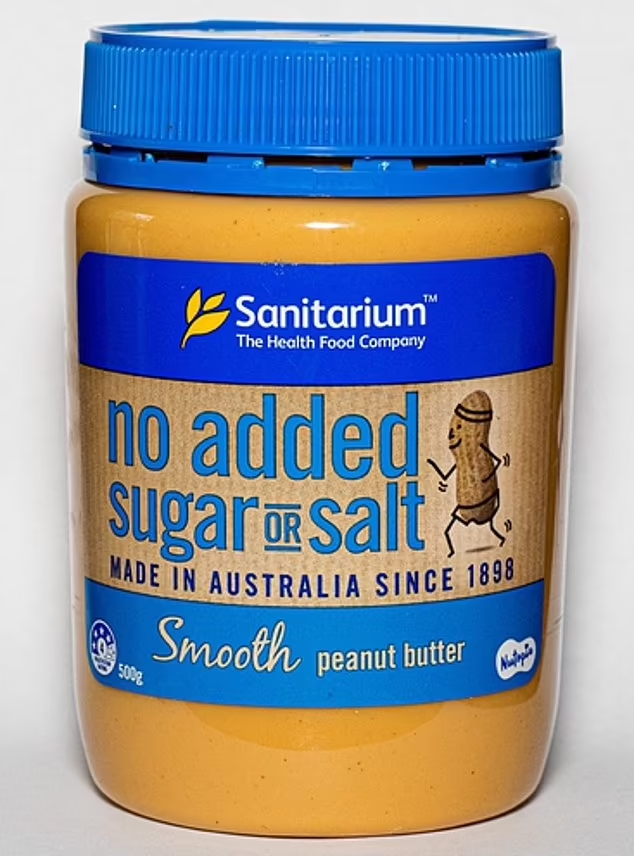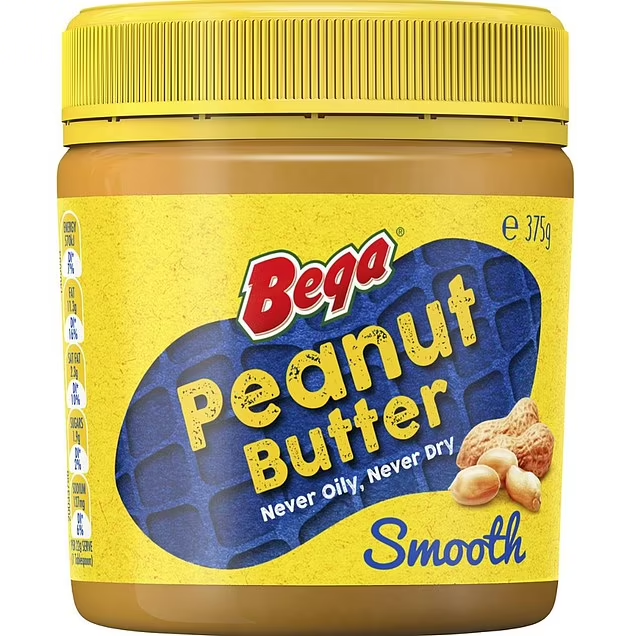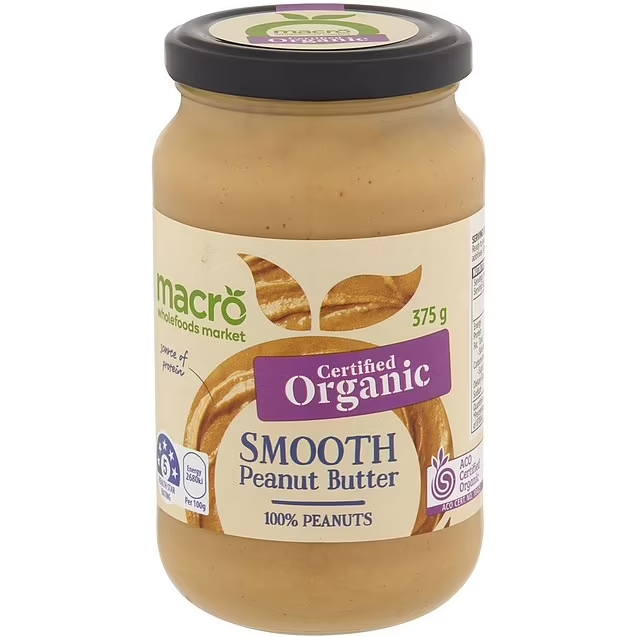Is your 'Australian-Made' peanut butter really Australian-made?
By
- Replies 10
We all know that Australia is a land of great food. From Vegemite to Tim Tams, we've got some of the best snacks in the world. But it seems like some of our favourite brands are trying to pull a fast one on us.
Popular brands including Bega and Sanitarium are marketing products as being 'Made in Australia', even though they contain little to no homegrown ingredients.
Peanut butter spreads from Bega, Sanitarium and Woolworths' Macro all use less than 25 per cent Australian ingredients, with one label containing no local products despite peanuts being grown here.
That's right, folks. Even though Australia is one of the world's leading producers of peanuts, some of our most popular peanut butter brands don't use a single drop of Australian peanuts in their products.

Certain peanut butter products that contain the label ‘Made in Australia’ barely use Australian-sourced peanuts. Credit: The Daily Mail UK.
Sanitorium
The peanut butter spreads from Sanitarium don't actually use any Australian ingredients, despite the 'Made in Australia' badge on its packaging.
A Sanitarium spokesperson explained that there are simply not enough peanut farmers in Australia to supply the demand for their product.
'To ensure a consistent year-round supply of Sanitarium peanut butter, we need to source peanuts from overseas,' the representative said.
'Country of Origin labelling was introduced a number of years back to provide consumers with information about where ingredients are sourced.
'This label appears on Sanitarium peanut butter, providing consumers with full transparency that the peanuts we use are not sourced in Australia. However, our claim that the product is 'Made in Australia' remains accurate.'

Some Bega peanut butter products only use 10% Australian ingredients. Credit: The Daily Mail UK.
Bega
If you're looking for peanut butter that's heavy on the Aussie ingredients, you might want to steer clear of Bega's traditional smooth, light, and chunky peanut butter spreads as well. According to the company, these products contain less than 10% Australian products.
Similar to Santorium, a representative explained that the reason behind this is that there simply aren't enough peanut farmers in Australia to meet the demand.
Bega is working with local farmers to try and change that, but in the meantime, they've had to reduce the percentage of Australian peanuts in their products.
'Aussie peanut farmers faced a tough season in 2019 due to challenging growing conditions in Queensland, driven by drought in several key growing regions,' the spokesperson said.
'Therefore, we have made the decision to temporarily reduce the percentage of Australian peanuts in our Bega Peanut Butter products. While this decision may be disappointing to some – we're hoping that this reduction is temporary.'
If you're looking for peanut butter that's 100% Australian, Bega's Simply Nuts product is a good alternative. Otherwise, you might want to stock up on Bega's spreads before the company runs out of Australian peanuts altogether!

Peanut butter manufacturers pointed out that the supply of peanuts in Australia is limited, hence they have to outsource ingredients from overseas. Credit: The Daily Mail UK.
Woolworths Macro
Despite what the label claims, Woolworths' Macro is yet another brand that is unexpectedly not created with 100% Australian peanuts; all of the peanuts used in this product are imported.
It should also be noted that it's the most expensive option on the market at $6 for 375 grams.
Vegans love this brand, however, because it contains no animal ingredients.
Woolworths stated that it wants to collaborate with farmers to ensure that Australia's peanut sector can be revived. However, they added that it's not always possible to acquire all of the ingredients locally because of Australia's limited supply of peanuts.
'We work with hundreds of Australian suppliers and aim to source local ingredients where we can. However Australian peanut supply is currently limited across the entire market,' a spokesperson explained.
'All our own brand food products feature the Australian Government's Country of Origin labelling, which is strictly regulated.
'The system provides clear labelling to help customers make an informed choice, explicitly identifying products that use 100 per cent Australian ingredients, and those that are made in Australia from local or imported ingredients.
'Across our own brand food products, 75 per cent are made in Australia to support local manufacturing and jobs, and many of them include Australian grown ingredients.'
So there you have it, Macro peanut butter isn't as Australian as you might think. But it's still a delicious and vegan-friendly option for those looking for a tasty treat.
The benefits of consuming locally produced products are many and varied. Perhaps the most obvious benefit is that it supports local farmers and businesses. When you buy local, you are investing in your community and ensuring that your neighbours can continue to make a living.
In addition to supporting your community, buying local also has a positive impact on the environment. Local products have a smaller carbon footprint because they haven’t been shipped long distances. And, since local farmers often use sustainable growing practices, you can be sure that your purchase is helping to protect the planet.
What’s more, local products are often fresher and of better quality than those that have been shipped in from far away. When you buy locally, you know that you are getting the best possible product.
Despite all of these benefits, we still face many challenges when it comes to consuming locally produced products. The supply of homegrown foods can be limited, leaving businesses to seek other alternatives. And, of course, local products can sometimes be more expensive than their imported counterparts.
Still, we believe that the benefits of consuming local products outweigh the challenges. When we make the choice to buy local, we are supporting our community, our environment, and our own health.
So, there you have it, folks! Do you think it's best for manufacturers to steer clear of the 'Made in Australia' label for the meantime to not confuse customers?
Popular brands including Bega and Sanitarium are marketing products as being 'Made in Australia', even though they contain little to no homegrown ingredients.
Peanut butter spreads from Bega, Sanitarium and Woolworths' Macro all use less than 25 per cent Australian ingredients, with one label containing no local products despite peanuts being grown here.
That's right, folks. Even though Australia is one of the world's leading producers of peanuts, some of our most popular peanut butter brands don't use a single drop of Australian peanuts in their products.
Certain peanut butter products that contain the label ‘Made in Australia’ barely use Australian-sourced peanuts. Credit: The Daily Mail UK.
Sanitorium
The peanut butter spreads from Sanitarium don't actually use any Australian ingredients, despite the 'Made in Australia' badge on its packaging.
A Sanitarium spokesperson explained that there are simply not enough peanut farmers in Australia to supply the demand for their product.
'To ensure a consistent year-round supply of Sanitarium peanut butter, we need to source peanuts from overseas,' the representative said.
'Country of Origin labelling was introduced a number of years back to provide consumers with information about where ingredients are sourced.
'This label appears on Sanitarium peanut butter, providing consumers with full transparency that the peanuts we use are not sourced in Australia. However, our claim that the product is 'Made in Australia' remains accurate.'
Some Bega peanut butter products only use 10% Australian ingredients. Credit: The Daily Mail UK.
Bega
If you're looking for peanut butter that's heavy on the Aussie ingredients, you might want to steer clear of Bega's traditional smooth, light, and chunky peanut butter spreads as well. According to the company, these products contain less than 10% Australian products.
Similar to Santorium, a representative explained that the reason behind this is that there simply aren't enough peanut farmers in Australia to meet the demand.
Bega is working with local farmers to try and change that, but in the meantime, they've had to reduce the percentage of Australian peanuts in their products.
'Aussie peanut farmers faced a tough season in 2019 due to challenging growing conditions in Queensland, driven by drought in several key growing regions,' the spokesperson said.
'Therefore, we have made the decision to temporarily reduce the percentage of Australian peanuts in our Bega Peanut Butter products. While this decision may be disappointing to some – we're hoping that this reduction is temporary.'
If you're looking for peanut butter that's 100% Australian, Bega's Simply Nuts product is a good alternative. Otherwise, you might want to stock up on Bega's spreads before the company runs out of Australian peanuts altogether!
Peanut butter manufacturers pointed out that the supply of peanuts in Australia is limited, hence they have to outsource ingredients from overseas. Credit: The Daily Mail UK.
Woolworths Macro
Despite what the label claims, Woolworths' Macro is yet another brand that is unexpectedly not created with 100% Australian peanuts; all of the peanuts used in this product are imported.
It should also be noted that it's the most expensive option on the market at $6 for 375 grams.
Vegans love this brand, however, because it contains no animal ingredients.
Woolworths stated that it wants to collaborate with farmers to ensure that Australia's peanut sector can be revived. However, they added that it's not always possible to acquire all of the ingredients locally because of Australia's limited supply of peanuts.
'We work with hundreds of Australian suppliers and aim to source local ingredients where we can. However Australian peanut supply is currently limited across the entire market,' a spokesperson explained.
'All our own brand food products feature the Australian Government's Country of Origin labelling, which is strictly regulated.
'The system provides clear labelling to help customers make an informed choice, explicitly identifying products that use 100 per cent Australian ingredients, and those that are made in Australia from local or imported ingredients.
'Across our own brand food products, 75 per cent are made in Australia to support local manufacturing and jobs, and many of them include Australian grown ingredients.'
So there you have it, Macro peanut butter isn't as Australian as you might think. But it's still a delicious and vegan-friendly option for those looking for a tasty treat.
The benefits of consuming locally produced products are many and varied. Perhaps the most obvious benefit is that it supports local farmers and businesses. When you buy local, you are investing in your community and ensuring that your neighbours can continue to make a living.
In addition to supporting your community, buying local also has a positive impact on the environment. Local products have a smaller carbon footprint because they haven’t been shipped long distances. And, since local farmers often use sustainable growing practices, you can be sure that your purchase is helping to protect the planet.
What’s more, local products are often fresher and of better quality than those that have been shipped in from far away. When you buy locally, you know that you are getting the best possible product.
Despite all of these benefits, we still face many challenges when it comes to consuming locally produced products. The supply of homegrown foods can be limited, leaving businesses to seek other alternatives. And, of course, local products can sometimes be more expensive than their imported counterparts.
Still, we believe that the benefits of consuming local products outweigh the challenges. When we make the choice to buy local, we are supporting our community, our environment, and our own health.
So, there you have it, folks! Do you think it's best for manufacturers to steer clear of the 'Made in Australia' label for the meantime to not confuse customers?










